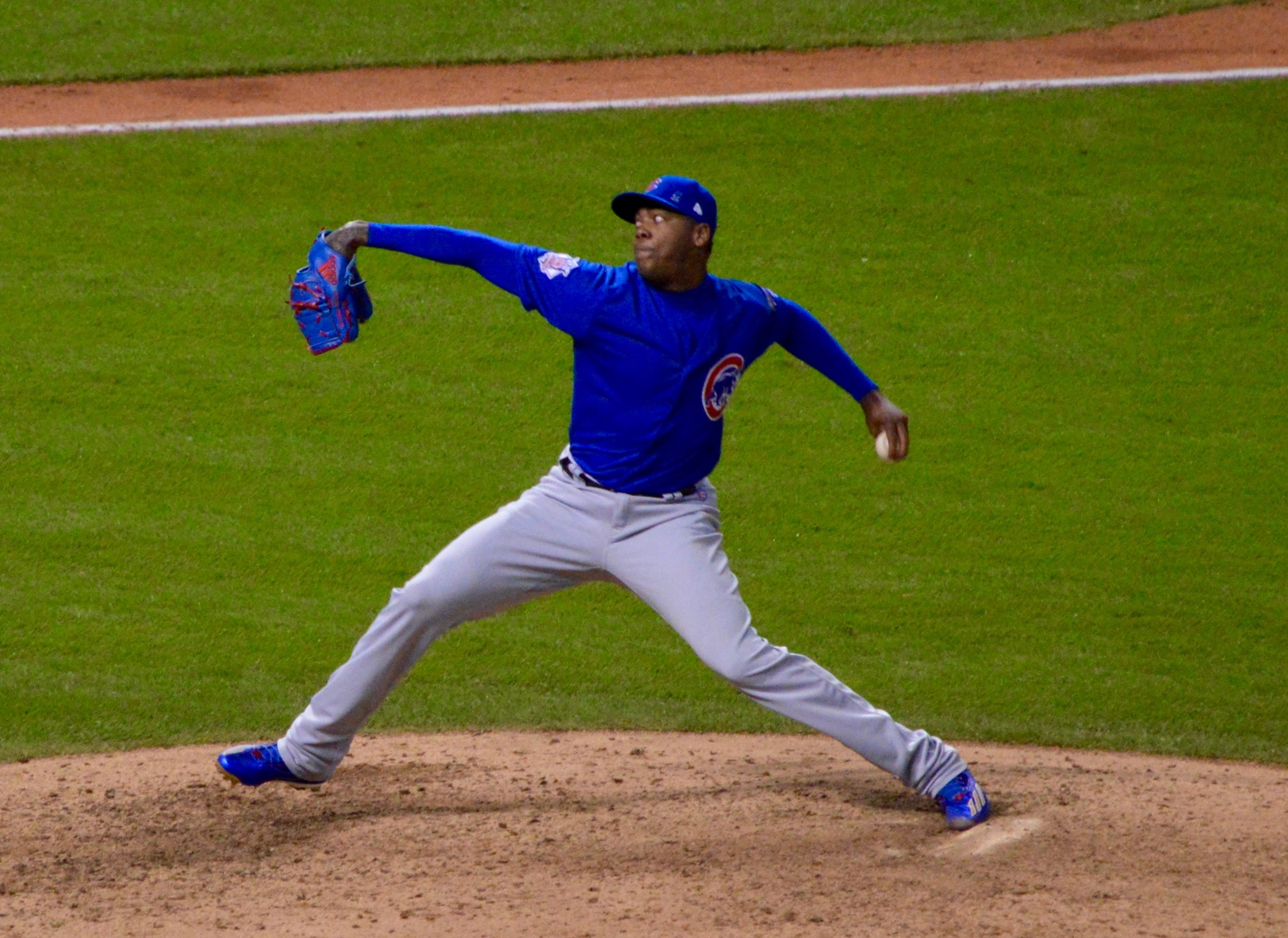
Aroldis Chapman Criticized Joe Maddon’s Managerial Decisions Because of Course He Did
There’s been an awful lot of criticism of Joe Maddon and his managerial decisions this past postseason, much of which I believe is unwarranted. The Cubs skipper addressed that second-guessing during the Winter Meetings, saying that the outcome is the only thing that matters. And the outcome was that the Cubs won the World Series, which is pretty much the best possible scenario. Unless you’re a fan of the Cleveland Indians, which, since you’re reading this, I assume you’re not.
In any case, the hubbub around Maddon’s choices had pretty much died down. Until, that is, Aroldis Chapman spoke to the media Friday for the first time since signing a five-year deal with the New York Yankees. Most of the press conference involved the standard softball questions from the media and rote comments from Chapman, but things got a little juicy when the richest reliever in baseball history addressed how Maddon utilized him in the World Series.
“I don’t agree the way he used me…but he is the manager and he has a strategy…I need to go in and do my job.”—Chapman on Joe Maddon in WS.
— Sweeny Murti (@SweenyMurti) December 16, 2016
Chapman said that he did not agree with how Joe Maddon and the Cubs used him in the postseason, but he feels healthy going into 2017.
— Bryan Hoch ⚾️ (@BryanHoch) December 16, 2016
Chapman said the one game he'd point to is Game 6 of the World Series, as he was tired for Game 7.
— Bryan Hoch ⚾️ (@BryanHoch) December 16, 2016
To be fair, I have not heard the interview and am assuming his comments were in response to a pointed question, rather than just him trying to disparage Joe Maddon. In an article on ESPN.com, Andrew Marchand quoted Chapman as saying, “There were couple of games, but the one I can point to is Game 6. The game was open and I don’t think he needed to [leave] me in the ninth. The important game was going to be Game 7 because we had that game almost won. The next day I came in tired.”
I can’t help but wonder aloud — by which I mean, “write words so you can read them” — why Chapman would choose now as the time to say that he didn’t agree with the way Maddon used him. Is it the pressure of the New York media? Is it the way he felt all along but was afraid to say for fear that he might be viewed as not being a prima donna? Is he making an excuse for giving up the game-tying home run in the bottom of the eighth inning of game 7 of the World Series?
There’s room for a lot of conjecture here, maybe too much, but the interesting thing to note is that this is an extremely dynamic situation. As such, coming to a conclusion can be nearly impossible. But don’t you worry, I’m still going to try.
Assuming Chapman was asked a direct question, I can’t fault him for giving a direct answer. The media is certainly aware of the fact that he gave up a big home run in a critical situation of the biggest game any team could ever hope to be in. The circumstances alone speak loudly to his response. Moreover, you can see below in this chart and graph from BrooksBaseball.net that Chapman’s fastball velocity took a nose-dive right around his 15th pitch in Game 7, which you may remember is when he began to rely more on his slider.
Put yourself in Chapman’s shoes: what would you say if a reporter just asked you about why you fell off a cliff in Game 7 of the World Series? The only thing he could say was that he didn’t agree with the way Maddon used him. I mean, you certainly wouldn’t expect him to say to the New York media, immediately after he’s just signed a five-year, $86 million contract with the Yankees, that he was tired and not up to the task. You also wouldn’t expect him to say that his arm might never be the same after all that usage.
The reality here is that Chapman was covering his tracks, and I can’t blame him. Given the results, he was never going to say that he agreed with how Maddon used him and that he just couldn’t perform, which, if we’re being honest, is what really happened. He’s a pitcher who’s being paid very handsomely to throw the ball really hard, and it was well advertised that Maddon was going to ride Chapman as much as possible. You don’t have a guy like that in your bullpen just to sit there until a nice, tidy ninth inning rolls around with no runners on base. You use him. And that’s exactly what Maddon did.
Was putting Chapman out there to face one batter in the top of the ninth inning of Game 6 really the reason he struggled in the finale? That one batter, Brandon Guyer, was walked on five pitches (all fastballs). Based on that outcome, it’s easy to say that Chapman was probably tired and shouldn’t have been out there at all. Of course, that’s exactly the kind of second-guessing Maddon was trying to shrug off. What if Maddon had taken Chapman out, only to see Strop give up a home run to Guyer. You see where I’m going, right?
We can bat the endless string of what-ifs around like addled kittens, but the fact remains that Joe Maddon led the Chicago Cubs to the 2016 World Series championship. And for that, I am eternally grateful.

